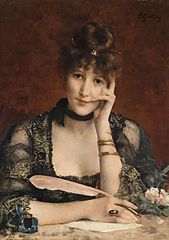What would you do if you found out that someone had stolen your idea for writing a book and published it under their name?
First of all, ideas can’t be copyrighted, but I must add—with emphasis—that there are vanishingly few original ideas. What makes a book uniquely yours is what you do with that idea. The vision and skill in execution that make it personal.
So what would I do? I’d cheer them on for having a great idea and for having gotten it in print. And then I’d write my own interpretation.
The best short story rejection I ever received was from a prestigious anthology. The editor loved my story but had just bought one on the same theme (mothers and cephalopods, although mine was with octopodes and the other with squid)—get this, from one of my dearest friends, a magnificent writer. Did I sulk? Did I mope? No, I celebrated her sale along with her! And then sold my story to another market.
In other words, be generous. If you do your work as a writer, this won’t be the only great idea you get.
How can you tell if a book needs an editor or a proofreader?
It does. Trust me on this. It doesn’t matter how brilliant the story is or how many books you’ve written. None of us can see our own flaws, whether they are grammar and typos or inconsistent, flat characters or plot holes you could drive a Sherman tank through. Or unintentionally offensive racial/sexist/ableist/etc. language. Every writer, for every project, needs that second pair of skilled, thoughtful eyes on the manuscript.
How do I get a self-published book into libraries?
If your book is available in print, the best way is to use IngramSpark and pay for an ad. Libraries are very reluctant to order KDP (Amazon) print editions. Same for bookstores.
If your book is digital only, put it out through Draft2Digital (D2D), which distributes to many vendors, including a number that sell to libraries.
Submit review copies to Library Journal. Consider paying for an ad if your budget allows.
Now for the hard part: publicizing your book to libraries. Besides contacting local libraries, assemble a list of contact emails for purchasing librarians (there may be such a thing already, so do a web search). Write a dynamite pitch. Send out emails with ordering links.
Is it better to title my chapters, or should I just stick to numbering them?
There is no “better.” There are conventions that change with time. Do what you love. Just as titles vs numbers cannot sell a book, neither will they sink a sale. If your editor or publisher has a house style, they’ll tell you and then you can argue with them.
That said, as a reader I love chapter titles. As an author, I sometimes come up with brilliant titles but I haven’t managed to do so for an entire novel, so I default to numbers. One of these years, I’ll ditch consistency and mix and match them. Won’t that be fun!
